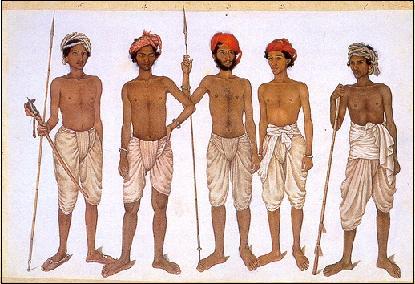|
Page < 1 2 3 4 5 6 7 8 9 10 11 12 13 14 15 16 17 18 19 20 21 22 23 24 >
British
"Justice" In India?
"Dogs and Indians not
allowed”
- Such a barbaric signs clearly classified Indians as belonging to some
other-than-human species.
Refer to The
parade of the vanquished and
On
A Neglected Aspect Of Western Racism – By
Kurt Jonassohn.
***
One of the claims oftenest made by Great Britain
is, that she has given to the Indian people better laws and a better judicial
system that they ever had before or could create for themselves....and this
fully justifies her in retaining possession of the land.
Sir Robert Fulton,
an eminent British official in India:
"The foundation of our empire in India rests
on the principle of justice, and England retains its supremacy in India mainly
by justice. Without justice we could not hold India for a moment, for it is that
which inspires the people of India with a confidence in us and with a belief
that in all our dealings with them we never act otherwise than fairly and
justly, and which renders them on the whole satisfied and contented with our
rule."
This is what the British are constantly saying to
the world in justification of their holding India in subjection. Is it true?
 In large part it is untrue. The Indian people
submit to it only because they have been disarmed and British battleships are in
all their harbors ready to bombard their cities; British canon and machine guns
are ready to mow down their men, women and children; and British bombing
airplanes are ready to blow up their villages, if they attempt to throw off the
yoke of their foreign masters. In large part it is untrue. The Indian people
submit to it only because they have been disarmed and British battleships are in
all their harbors ready to bombard their cities; British canon and machine guns
are ready to mow down their men, women and children; and British bombing
airplanes are ready to blow up their villages, if they attempt to throw off the
yoke of their foreign masters.
Mr. John Dickinson,
in his book, "Government of India Under a
Bureaucracy," describes the kind of legal system set up by the
British and the results it produced. He says:
"We, the English, ignorantly assumed that
the ancient, long civilized people of India, were a race of barbarians who had
never known what justice was until we came among them, and that the best thing
we could do for them was to upset all their institutions as fast as we could,
among them their judicial system, and give them instead a copy of our legal
models at home...it would have been the grossest political empiricism for force
it on a people so different from ourselves....and the reader may conceive the irreparable
mischief it has done to India..."
Sir Henry Cotton
in his book "New India" p. 170
says:
"The people of India possess an instinctive
capacity for local self-government. It is by the reason of the British
administration, only, that the popular authority of the village headman has been
sapped, and the judicial power of the Panchayat,
or Committee of Five has been subverted. "
The gravest charge of all against the British
legal system in India, was that of partiality, favoritism towards Europeans,
especially Englishmen, resulting in serious and widespread injustice to the
Indian people. Says a prominent Calcutta daily: "No man in this country can
knock an Englishman down without promptly being arrested and sent to jail. But
an Englishman may knock a dozen Indians down and go scot-free. If the Indian
attempts to defend himself against his British assailant, the officer is on him
in no time, and he goes to jail for heavy sentence."
Says a Bombay daily: "A European kicks his
servant to death. The local magistrate finds him guilty of simple assault and
fines him one pound, six shillings and eight pence. An appeal to the Bombay High
Court increases the sentence to nine months imprisonment."
In another case, an Englishman kicks a sweeper,
rupturing his spleen, which results in his death, and is ordered to pay a fine
of 50 rupees with no imprisonment. Yet in another case, an Indian is sentenced
to 20 years imprisonment for attempting to rape an Englishwoman, while in the
same province an Englishman who gags and rapes a Hindu girl of 18 is acquitted,
with no punishment at all.
In November, 1923, some British soldiers who had
been out fox-hunting near the village of Lohagaon, in the vicinity of Poona,
fell into an altercation with the villagers, when one of the villagers was shot
dead by a soldier named Walker. The soldier was tried by the Sessions Court
before European jurors and British judges and acquitted.
Mr. K. C. Kelkar,
President of the Poona City Municipality and Editor of the weekly Kesari
commented editorially in the paper as follows:
"Such farces of trials of Europeans accused
of crimes against Indians are not new among us. They date back to the times of
Warren Hastings. The thing to be most regretted is that
with such things taking place before their very eyes there are persons who keep
singing the praise of British justice. By good rights a pillar ought
to be erected at Lohagaon having engraved on it the full details of this case,
as a memorial showing what value is attached to the lives of Indians under
British rule."
(source:
India
in Bondage: Her Right to Freedom - By Rev. Jabez T. Sunderland
p.105-119).
  
Page < 1 2 3 4 5 6 7 8 9 10 11 12 13 14 15 16 17 18 19 20 21 22 23 24 >
|